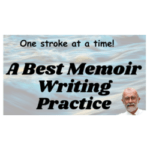When learning to write memoir, it can feel awkward and uncomfortable as you learn the process, just like in learning to swim. We often see people who are not comfortable swimming flail about in the water, their heads reaching up high, desperately, to catch a breath of air. They usually execute strokes too fast. This awkward gesture soon tires them. Try as they might there is not enough air for them as they constrict their ribs, twist their heads, contort their jaws. Soon enough, considering that they had set out to enjoy the water, these people quit and return to the shore. Swimming is over for the day.
Stay with me a moment as I extend this image. As I was swimming in Ceasar Pond last summer, not far from my home, I remembered learning to swim. A woman who was my coach told me that, if I positioned my arms correctly – and she showed me what “correct” was, I would find a pocket of ample air. I could breathe into this pocket without stressing my rib cage, my lungs, my mouth and I could get as much air as I needed. Of course, her telling me was not enough for me to find that pocket where I could have as much air as my lungs good hold, as much air as I could breathe were I in the middle of a field.
Needs More Practice
After her instruction, when I entered the water and positioned my arms as I thought she had told me, I was still not able to find that pocket of air. For a while, I went up and down the pool struggling to find the air that she had told me would be there. Occasionally, I would stop and she would say to me, “Stretch your left arm more. Turn your head slightly more towards your shoulder. Be sure your right hand is at your knees about ready to come out as your left hand goes into the water.”
Very easy to say but hard to do. Left arm, right arm, head. It seemed too much, but I continued to practice because I wanted to be a good swimmer.
Then came the moment when, all of a sudden, I found myself breathing as much air as I could possibly want, as much air as I could breathe in the middle of an open field.
As I was swimming at Ceasar Pond, I remembered these swimming instructions and felt gratitude for my coach. What I struggled to learn then has been second nature for me now for decades. I became an excellent swimmer and continue to enjoy swimming in lakes and ponds here in Maine. Swimming has been such a pleasure!
Learning to write a memoir is like learning to swim
It is possible for a writing coach to instruct a person on proper writing techniques, on better styling, on effective characterization and on using action to move the reader along the narrative arc. If the coach were to give a written test to that person, it is entirely possible that the apprentice writer would get an A+. But something happens between the knowledge of what one ought to do and the practice of it.
The writer sits at her computer and begins to compose. Her story does not come out as she thought it would when she was envisioning it in her head. There’s something missing!
“What’s missing? Why isn’t this working?” she asks herself.
Like the swimmer who is gulping in water and growing increasingly tired, our writer is growing frustrated and she is sure she will never learn to write memoir well. She might even think, “I’m such a terrible writer.”
A memoir coach is like a swimming coach
A coach—whether a swimming coach or a writing coach—can impart valuable feedback to a learner. Perhaps your writing teacher will tell you to write in shorter sentences or to write more spontaneously or perhaps what you need is fewer adjectives or a re-conceptualization of your story.
Often the writer may not need new information. What the writer needs is practice and feedback on that practice. As with a swimmer, the writer arrives at a point when he knows that he is doing something right. All of a sudden, like the swimmer with air, he finds that pocket of inspiration and learned technique where everything he needs to keep going is there available to him.
It is possible, of course, both for the swimmer and for the writer to learn craft or skill without working with a coach. But it can take much longer. Read on.
The example of Winston Churchill
I once read that Winston Churchill, who was a talented amateur painter, spent two years learning perspective on his own. Later, Churchill discovered that perspective in a painting could be taught in a studio class in a matter of a few weeks.
“But aren’t you glad you learned it on your own?” someone said to him.
“No,” responded Churchill (and I’m paraphrasing here), “learning perspective was not the most interesting thing that I might have done as an artist in those years. I would much rather have pursued my subjects without having to spend so much time on technique.”
The Leap from swimming and painting to writing
Think about how you can spend the next year working on writing techniques alone, never knowing if it is measuring up or not knowing how to stop gulping all that water, not knowing where there might be shortcuts. Alternately, you can spend the next months with a memoir coach who is also skilled at teaching. You can learn quickly the writing techniques to write a memoir that will enable you to move on to telling your story, to delivering your message.
Below is a link to this week’s FREE video e-course.
And remember: “inch by inch, it’s a cinch; yard by yard it’s hard.”
Good luck writing your stories!
 What would happen to the memoir conversation if…
What would happen to the memoir conversation if…
- …you took a moment to present this informative post to your friends and family by linking this article on your social media? Just a click. It’s so easy.
- …you reposted this article on your own blog or website? It’s free and you’d both have some valuable content to boost your blog’s reputation and you would be providing your readers with valuable guidance. For the best procedure on how to do this, click here.
- …you subscribed to our YouTube channel?


No comments yet.